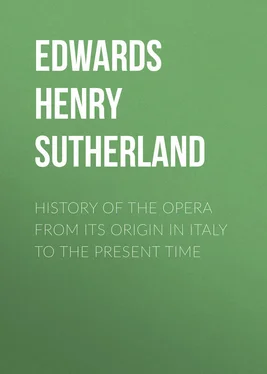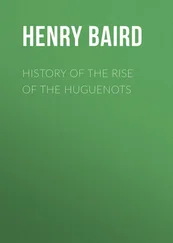Henry Edwards - History of the Opera from its Origin in Italy to the present Time
Здесь есть возможность читать онлайн «Henry Edwards - History of the Opera from its Origin in Italy to the present Time» — ознакомительный отрывок электронной книги совершенно бесплатно, а после прочтения отрывка купить полную версию. В некоторых случаях можно слушать аудио, скачать через торрент в формате fb2 и присутствует краткое содержание. Жанр: foreign_home, music_dancing, foreign_antique, foreign_prose, на английском языке. Описание произведения, (предисловие) а так же отзывы посетителей доступны на портале библиотеки ЛибКат.
- Название:History of the Opera from its Origin in Italy to the present Time
- Автор:
- Жанр:
- Год:неизвестен
- ISBN:нет данных
- Рейтинг книги:4 / 5. Голосов: 1
-
Избранное:Добавить в избранное
- Отзывы:
-
Ваша оценка:
- 80
- 1
- 2
- 3
- 4
- 5
History of the Opera from its Origin in Italy to the present Time: краткое содержание, описание и аннотация
Предлагаем к чтению аннотацию, описание, краткое содержание или предисловие (зависит от того, что написал сам автор книги «History of the Opera from its Origin in Italy to the present Time»). Если вы не нашли необходимую информацию о книге — напишите в комментариях, мы постараемся отыскать её.
History of the Opera from its Origin in Italy to the present Time — читать онлайн ознакомительный отрывок
Ниже представлен текст книги, разбитый по страницам. Система сохранения места последней прочитанной страницы, позволяет с удобством читать онлайн бесплатно книгу «History of the Opera from its Origin in Italy to the present Time», без необходимости каждый раз заново искать на чём Вы остановились. Поставьте закладку, и сможете в любой момент перейти на страницу, на которой закончили чтение.
Интервал:
Закладка:
This, from a man whose operas did not fail, but on the contrary, were highly successful, is rather too bad. But the author of the ill-fated "Rosamond" himself visited the French Opera, and has left an account of it, which corresponds closely enough to Favart's poetical description. "I have seen a couple of rivers," he says, (No. 29 of the Spectator ) "appear in red stockings, and Alpheus, instead of having his head covered with sedge and bulrushes, making love in a fair, full-bottomed, periwig, and a plume of feathers, but with a voice so full of shakes and quavers that I should have thought the murmurs of a country brook the much more agreeable music. I remember the last opera I saw in that merry nation was the "Rape of Proserpine," where Pluto, to make the more tempting figure, puts himself in a French equipage, and brings Ascalaphus along with him as his valet de chambre ." This is what we call folly and impertinence, but what the French look upon as gay and polite."
Addison's account agrees with Favart's song and also with one by Panard, which contains this stanza: —
"J'ai vu le soleil et la lune
Qui faissient des discours en l'air
J'ai vu le terrible Neptune
Sortir tout frisé de la mer ."
Panard's song, which occurs at the end of a vaudeville produced in 1733, entitled Le départ de l'Opéra , refers to scenes behind as well as before the curtain. It could not be translated with any effect, but I may offer the reader the following modernized imitation of it, and so conclude the present chapter.
I've seen Semiramis, the queen;
I've seen the Mysteries of Isis;
A lady full of health I've seen
Die in her dressing-gown, of phthisis.
I've seen a wretched lover sigh,
" Fra poco " he a corpse would be,
Transfix himself, and then – not die,
But coolly sing an air in D.
I've seen a father lose his child,
Nor seek the robbers' flight to stay;
But, in a voice extremely mild,
Kneel down upon the stage and pray.
I've seen "Otello" stab his wife;
The "Count di Luna" fight his brother;
"Lucrezia" take her own son's life;
And "John of Leyden" cut his mother.
I've seen a churchyard yield its dead,
And lifeless nuns in life rejoice;
I've seen a statue bow its head,
And listened to its trombone voice.
I've seen a herald sound alarms,
Without evincing any fright:
Have seen an army cry "To arms"
For half an hour, and never fight.
I've seen a naiad drinking beer;
I've seen a goddess fined a crown;
And pirate bands, who knew no fear,
By the stage manager put down;
Seen angels in an awful rage,
And slaves receive more court than queens,
And huntresses upon the stage
Themselves pursued behind the scenes.
I've seen a maid despond in A,
Fly the perfidious one in B,
Come back to see her wedding day,
And perish in a minor key.
I've seen the realm of bliss eternal,
(The songs accompanied by harps);
I've seen the land of pains infernal,
With demons shouting in six sharps!
CHAPTER IV.
INTRODUCTION AND PROGRESS OF THE BALLET
The Ballets of Versailles. – Louis XIV. astonished at his own importance. – Louis retires from the stage; congratulations addressed to him on the subject; he re-appears. – Privileges of Opera dancers and singers. – Manners and customs of the Parisian public. – The Opera under the regency. – Four ways of presenting a petition. – Law and the financial scheme. – Charon and paper money. – The Duke of Orleans as a composer. – An orchestra in a court of justice. – Handel in Paris. – Madame Sallé; her reform in the Ballet, and her first appearance in London.
AFTER the Opera comes the Ballet. Indeed, the two are so intimately mixed together that it would be impossible in giving the history of the one to omit all mention of the other. The Ballet, as the name sufficiently denotes, comes to us from the French, and in the sense of an entertainment exclusively in dancing, dates from the foundation of the Académie Royale de Musique, or soon afterwards. During the first half of the 17th century, and even earlier, ballets were performed at the French court, under the direction of an Italian, who, abandoning his real name of Baltasarini, had adopted that of Beaujoyeux. He it was who in 1581 produced the " Ballet Comique de la Royne ," to celebrate the marriage of the Duc de Joyeuse. This piece, which was magnificently appointed, and of which the representation is said to have cost 3,600,000 francs, was an entertainment consisting of songs, dances, and spoken dialogue, and appears to have been the model of the masques which were afterwards until the middle of the 17th century represented in England, and of most of the ballets performed in France until about the same period. There were dancers engaged at the French Opera from its very commencement, but it was difficult to obtain them in any numbers, and, worst of all, there were no female dancers to be found. The company of vocalists could easily be recruited from the numerous cathedral choirs; for the Ballet there were only the dancing-masters of the capital to select from, the profession of dancing-mistress not having yet been invented. Nymphs, dryads, and shepherdesses were for some time represented by young boys, who, like the fauns, satyrs, and all the rest of the dancing troop wore masks. At last, however, in 1681, Terpsichore was worthily represented by dancers of her own sex, and an aristocratic corps de ballet was formed, with Madame la Dauphine, the Princess de Conti, and Mdlle. de Nantes as principal dancers, supported by the Dauphin, the Prince de Conti and the Duke de Vermandois. They appeared in the Triomphe de l'Amour , and the astounding exhibition was fully appreciated. Previously, the ladies of the court, when they appeared in ballets, had confined themselves to reciting verses, which sometimes, moreover, were said for them by an orator engaged for the purpose. To see a court lady dancing on the stage was quite a novelty; hence, no doubt, the success of that spectacle.
The first celebrated ballerina at the French Opera was Mademoiselle La Fontaine, styled la reine de la danse – a title of which the value was somewhat diminished by the fact that there were only three other professional danseuses in Paris. Lulli, however, paid great attention to the ballet, and under his direction it soon gained importance. To Lulli, who occasionally officiated as ballet-master, is due the introduction of rapid style of dancing, which must have contrasted strongly with the stately solemn steps that were alone in favour at the Court during the early days of Louis XIV's reign. The minuet-loving Louis had notoriously an aversion for gay brilliant music. Thus he failed altogether to appreciate the talent of "little Baptiste" not Lulli, but Anet, a pupil of Corelli, who is said to have played the sonatas of his master very gracefully, and with an "agility" which at that time was considered prodigious. The Great Monarch preferred the heavy monotonous strains of his own Baptiste, the director of the Opera. It may here be not out of place to mention that Lulli's introduction of a lively mode of dancing into France (it was only in his purely operatic music that he was so lugubriously serious) took place simultaneously with the importation from England of the country-dance – and corrupted into contre-danse , which is now the French for quadrille. Moreover, when the French took our country-dance, a name which some etymologists would curiously enough derive from its meaningless corruption – we adopted their minuet which was first executed in England by the Marquis de Flamarens, at the Court of Charles II. The passion of our English noblemen for country-dances is recorded as follows in the memoirs of the Count de Grammont: – "Russel was one of the most vigorous dancers in England, I mean for country-dances ( contre-danses ). He had a collection of two or three hundred arranged in tables, which he danced from the book; and to prove that he was not old, he sometimes danced till he was exhausted. His dancing was a good deal like his clothes; it had been out of fashion twenty years."
Читать дальшеИнтервал:
Закладка:
Похожие книги на «History of the Opera from its Origin in Italy to the present Time»
Представляем Вашему вниманию похожие книги на «History of the Opera from its Origin in Italy to the present Time» списком для выбора. Мы отобрали схожую по названию и смыслу литературу в надежде предоставить читателям больше вариантов отыскать новые, интересные, ещё непрочитанные произведения.
Обсуждение, отзывы о книге «History of the Opera from its Origin in Italy to the present Time» и просто собственные мнения читателей. Оставьте ваши комментарии, напишите, что Вы думаете о произведении, его смысле или главных героях. Укажите что конкретно понравилось, а что нет, и почему Вы так считаете.












